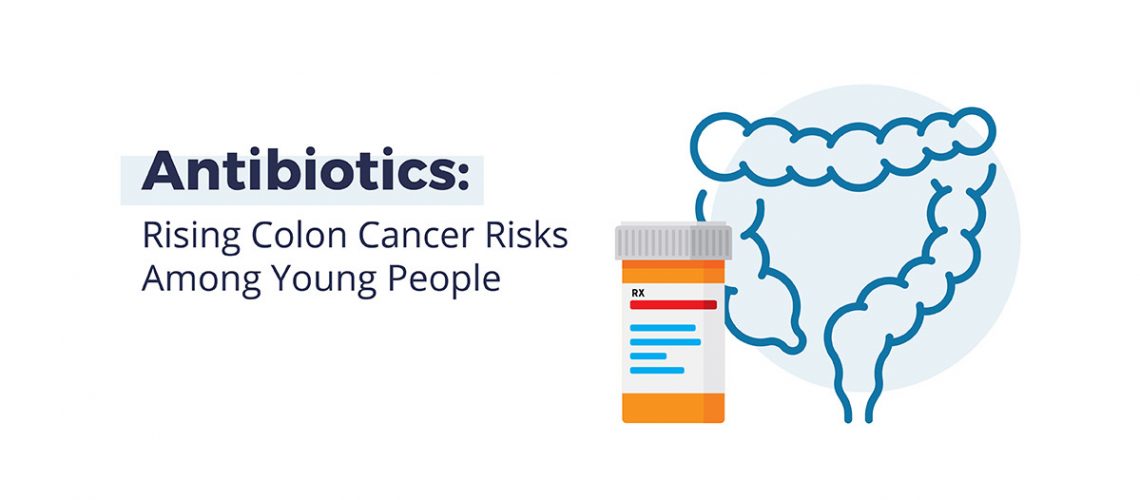Digest This
Click on the topics below to learn how probiotics can improve your digestive health, naturally.

Antibiotics And The Risk Of Colon Cancer
- @drHoberman
- Disease, Drug interactions, Probiotics
Antibiotics: Rising Colon Cancer Risks Among Young People
For a very long time, health professionals and patients believed colon cancer — the third most common cancer among Americans — was a major health challenge mainly for older folks.
That perception changed for good recently, when the U.S. Preventative Services Task Force recommended lowering initial screenings for colon cancer to age 45.
That was a huge wake-up call, but a very necessary one given the steady increase in younger colon cancer cases and lower screening rates among that age group.
That uptick also reflects data collected by the American Cancer Society that found patients born in 1990 have double the risk of colon cancer compared to people born in 1950.
All of this underscores the fact that colon cancer is a multi-faceted problem, including several risk factors (poor diets and sedentary lifestyles) well within our control.
We can now add antibiotics to the growing list of concerns based a pair of recent reports from the UK and Sweden.
More Antibiotics, More Colon Cancer Reports
Most of you are very well aware of the disruptive nature of antibiotics, and not just to the balance of bacteria in your gut.
Antibiotics have been prescribed so often for health problems, including viral conditions like the flu and common colds that they’re not equipped to treat, they don’t work when we really need them.
Based on two large analyses of patients in Scotland and Sweden, this very liberal use of antibiotics may increase one’s colon cancer risks too.
In the Swedish analysis that studied the health of 40,000 patients from the Swedish Colorectal Cancer Registry from 2010-16 to 200,000 cancer-free patients, antibiotics increased the risk of colon cancer by 17 percent.
What’s more, Swedish scientists believe the disruptive impact of antibiotics on the microbiome is the probable trigger for this increase in colon cancer patients.
The Scottish review of 8,000 colon cancer patients that compared to an equal number of healthy folks found a similar increase in colon cancer rates across all age groups, with one more very alarming trend.
The risk of colon cancer among patients under age 50 was elevated by nearly 50 percent, compared to 9 percent in the above age 50 group. What’s more, very common quinolone (like Cipro) and sulfonamide (like Bactrim) antibiotics were associated with cancers on the right side of the colon where microbiomes reside.
So, how can colon cancer risks jump so high for younger folks apart from the overuse of antibiotics and sedentary lifestyle habits?
Experts believe the lack of routine screenings for young people from ages 20-40 account for high colon cancer rates. Moreover, fewer physicians and younger patients will connect unusual abdominal pains with colon cancer, thus those problems will be detected much later when the disease is harder to treat.
What You Can Do!
First, it’s important to remember that taking any antibiotics should be done wisely and cautiously. If you have any concerns about an antibiotic (or any other drug), don’t hesitate to consult with your doctor or pharmacist.
When an antibiotic is necessary, please take it as prescribed by your physician until your course is completed, not only until you’re feeling better.
Want to lessen your need for antibiotics? I urge you to review my recent Antibiotics 101 article for some very important tips that cover everything from good hand-cleaning rules to monitoring your use of prescription pain relievers.
If you want to protect the healthy balance of bacteria in your gut, especially while you’re taking an antibiotic, be sure to take a probiotic about two hours afterward. (Check out our article on the basics of How to Take a Probiotic for more guidance.)
Also, there’s growing evidence we’ve shared here about the benefits of taking a probiotic in relation to treating and possibly preventing colon cancer.
Remember that any probiotic you consider should include multiple strains of beneficial bacteria to protect your gut, the center of your body’s immune system, like those found in like EndoMune Advanced Probiotic.
Resources
Journal of the National Cancer Institute
European Society for Medical Oncology
There Is An Endomune Probiotic For Every Lifestyle
-
EndoMune Metabolic Rescue
$44.95 -
EndoMune Advanced Probiotic
$42.95 -
EndoMune Companion Pack
$112.93









